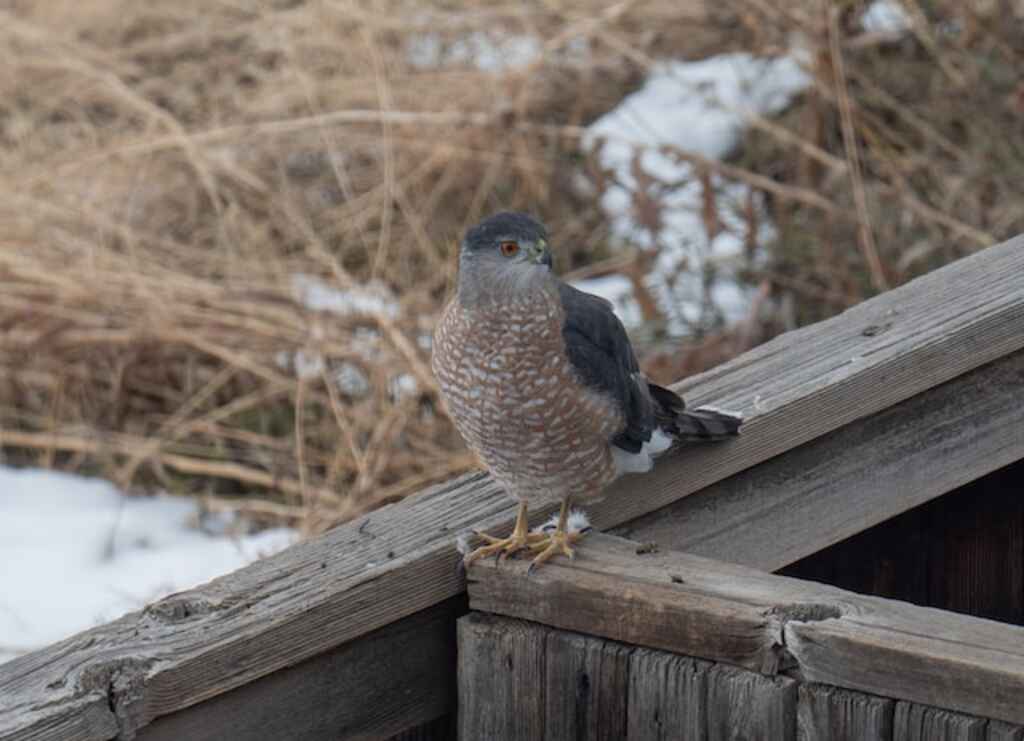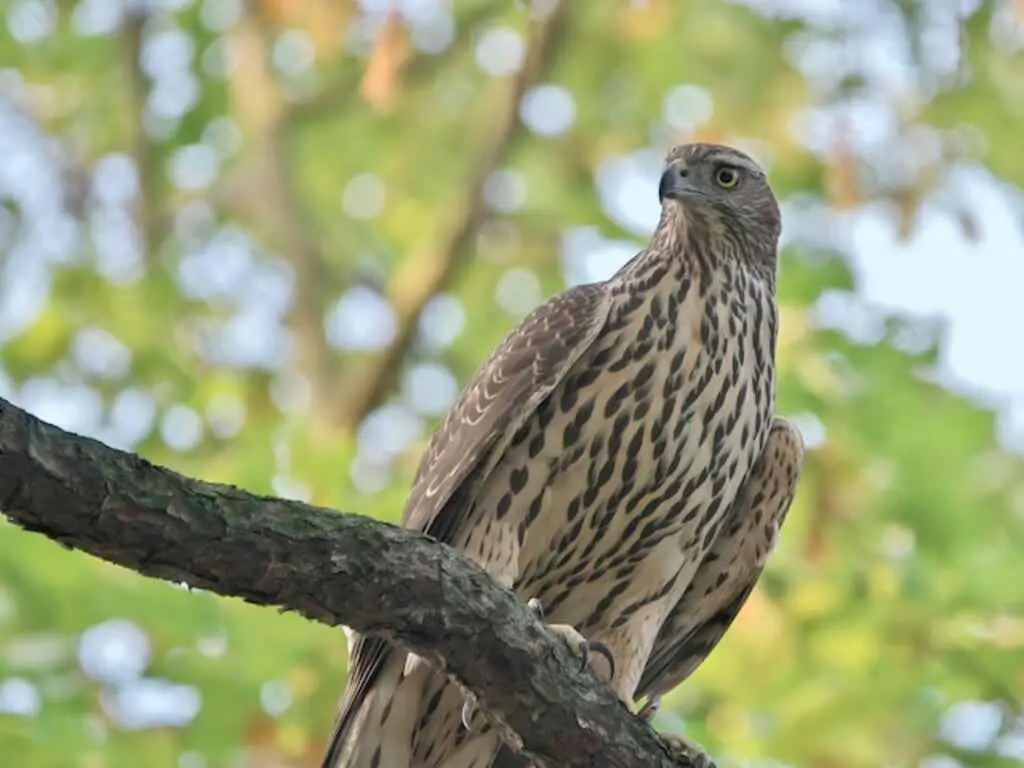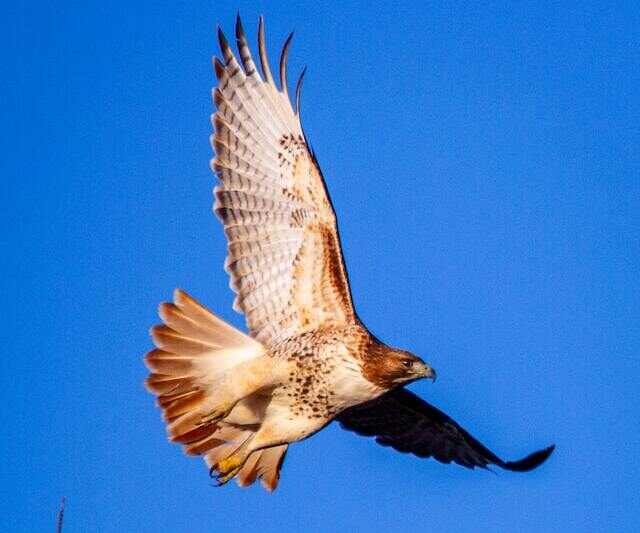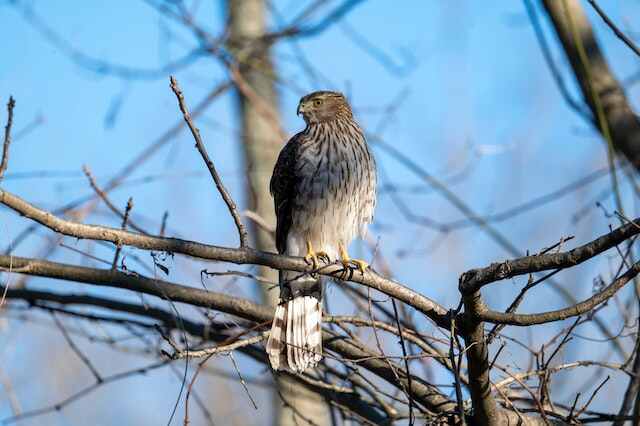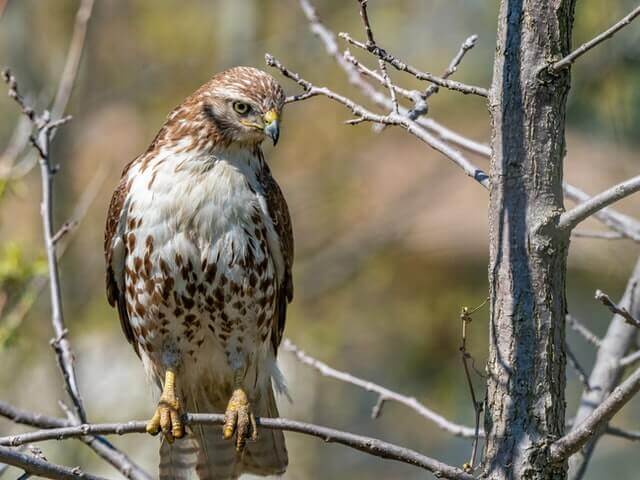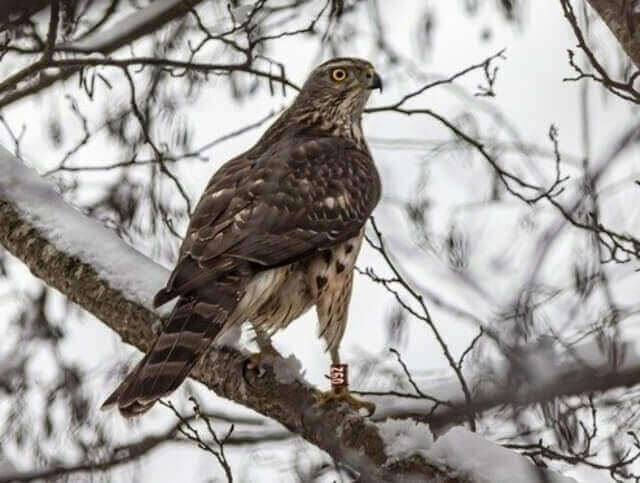Do Hawks Eat Raccoons? The answer may surprise you! While hawks are known for their knack for swooping down on smaller prey, the idea of a raccoon on their menu seems a bit outlandish, right?
Well, get ready to dive into the intriguing world of these feathered predators and discover the fascinating truth about their appetite for mischief-making raccoons. Brace yourself for a wild ride!
Table of Contents
- 1 Definition of Hawks and Raccoons
- 2 Overview of Relationship between Hawks and Raccoons
- 3 Importance of Understanding the Feeding Habits of Hawks
- 4 Do Hawks Eat Raccoons?
- 5 The Role of Raccoons in the Food Chain
- 6 The Impact on Humans
- 7 Conclusion
- 8 FAQs: Do Hawks Eat Raccoons?
- 8.1 Can hawks really eat raccoons?
- 8.2 Are raccoons a common food source for hawks?
- 8.3 Why would a hawk go after a raccoon?
- 8.4 Do hawks actively hunt raccoons?
- 8.5 Are juvenile raccoons more susceptible to hawk predation?
- 8.6 What factors influence a hawk’s decision to prey on a raccoon?
- 8.7 Do hawks eat raccoons in urban areas?
- 8.8 Do raccoons have any defense mechanisms against hawks?
- 8.9 Do raccoons play a role in the hawk’s food chain?
- 8.10 How can humans coexist with hawks and raccoons?
- 9 Author
Definition of Hawks and Raccoons
Hawks are birds of prey that belong to the family Accipitridae. They have sharp talons and beaks that allow them to catch their prey quickly. There are many species of hawks, including red-tailed hawks, Cooper’s hawk, and goshawk.
These birds are commonly found throughout North America. On the other hand, raccoons are omnivorous mammals that belong to the family Procyonidae.
They have a distinct black mask around their eyes and striped tails. Raccoons typically eat insects, small animals such as mice or rabbits, fruits, nuts and vegetation.
Overview of Relationship between Hawks and Raccoons
The relationship between hawks and raccoons is complex, as they both occupy similar habitats as predators but also food sources for one another.
While hawks do not typically feed on large mammals like raccoons-they normally hunt smaller prey like rodents- it’s not unusual for a hawk to attempt capturing a young or injured raccoon if an opportunity arises.
Raccoon behavior often arouses curiosity in raptors due to their scavenger tendencies when foraging for food in compost bins or dumpsters – which could attract hungry raptors on occasion when no other prey is available nearby.
In addition to being potential prey for each other, hawks serve as natural predators against rodent population explosions, which could negatively impact raccoon diets.
Importance of Understanding the Feeding Habits of Hawks
Understanding the feeding habits of hawks is important for several reasons. Firstly, hawks play an essential role in maintaining a healthy ecosystem by regulating the populations of their prey.
Additionally, knowing what hawks eat can help us better understand how to protect certain species in threatened or endangered status from dwindling numbers.
Furthermore, understanding the feeding habits of hawks can promote effective conservation efforts where necessary to ensure that they continue playing their vital roles in maintaining a healthy balance in the ecosystems where they reside.
Overall, it’s important to have an understanding of the ecology and behavior patterns between predators and prey in nature to appreciate and protect our environment.
Do Hawks Eat Raccoons?
Understanding Hawk’s Diet
Hawks are birds of prey that belong to the family Accipitridae. They are known for their sharp talons and hooked beaks, which they use to catch and kill small animals such as rodents, snakes, rabbits, and birds.
The diet of a hawk varies depending on the species, size of the bird, and its geographic location.
Most hawks’ main diet consists of small mammals like mice or voles. However, larger species such as red-tailed hawks can hunt larger prey like squirrels or rabbits.
Hawks tend to hunt during the day, when their prey is most active. They usually catch their prey by swooping down from above and using their sharp talons to grab it in mid-air.
Evidence Supporting Hawks Eating Raccoons
While raccoons may not be a typical part of a hawk’s diet, there is evidence supporting that they do occasionally eat them.
Raccoons are nocturnal animals that are active at night and spend most of their time on the ground. This makes them an easy target for hawks that hunt during the day.
One study found that in areas where raccoons were abundant, Cooper’s hawks were more likely to eat them than in areas where raccoons were less common.
The study also found that juvenile raccoons were more vulnerable to hawk predation than adult raccoons.
Another study observed red-shouldered hawks eating juvenile raccoons in Florida. The researchers concluded that these incidents were likely opportunistic rather than a regular part of the hawk’s diet.
Factors That Influence a Hawk’s Decision To Prey On Raccoons
Several factors may influence whether or not a hawk decides to prey on a raccoon. One important factor is the size of the hawk.
Smaller hawks such as sharp-shinned hawks are less likely to prey on larger mammals like raccoons. The availability of other prey may also play a role.
If there are plenty of small mammals available, a hawk may not need to hunt raccoons.
Habitat is another important factor, as some hawks prefer open habitats while others prefer forested areas where raccoons are more common.
The behavior of the raccoon may influence whether or not a hawk decides to prey on it. If a raccoon is alert and aware of its surroundings, it may be able to avoid being caught by a hawk.
However, if a raccoon is injured or sick, it may be an easier target for predators like hawks.
While raccoons may not be a typical part of a hawk’s diet, there is evidence supporting that they do occasionally eat them.
The decision for a hawk to prey on a raccoon depends on several factors including size, availability of other prey and behavior.
Understanding predator-prey relationships in nature can help us better understand the importance of each animal’s role in the ecosystem.
The Role of Raccoons in the Food Chain
Raccoons are mammals that belong to the family Procyonidae. They are omnivores, which means they eat both plants and animals.
Their diet includes insects, fruits, nuts, birds, fish, and small mammals. Raccoons play a vital role in the food chain as they are prey to a wide range of predators such as coyotes, foxes, wolves, bobcats and of course hawks.
Explanation of raccoon’s diet
Raccoons are opportunistic feeders, which means they will eat whatever is available to them. A majority of their diet consists of invertebrates such as beetles and crabs.
They also consume fruits like cherries and berries, along with nuts and seeds from various trees.
In addition to this, their diet also includes small rodents like mice, rabbits, as well as larger prey like muskrats or opossums.
Importance of raccoons in the ecosystem
As omnivores that thrive in urban areas due to increased food sources from human activities such as waste disposal coupled with their adaptability towards various environments makes them important contributors to the ecosystem.
Raccoons help control populations of certain insect’s species like beetle larvae that damage crops by feeding on them, while also facilitating seed dispersal for many local plant species.
How their role affects the food chain
Being an important source of food for many larger carnivores including hawks makes it critical for raccoons to maintain healthy population numbers so that ecosystem equilibrium is sustained; if one part fails, then it can have cascading effects throughout all levels up and down the chain.
Raccoon populations that become too low due to over-hunting or habitat loss (e.g. urbanization) can lead to higher populations of other animals preying on their prey.
This is because there are fewer raccoons available to hunt, which means larger predators will feed more on other prey species, leading to imbalanced ecosystems, reduced biodiversity, and ultimately the inability of these systems to support other forms of life.
Raccoons are an important part of the food chain as they play a critical role in maintaining ecological balance by controlling populations of certain insects and facilitating seed dispersal for many local plants while also serving as prey for many larger carnivores including hawks.
It is important for us to conserve their populations and maintain healthy numbers so that we can continue to enjoy a diverse and thriving ecosystem.
The Impact on Humans
Humans have a significant impact on wildlife, including hawks and raccoons. The encroachment of human civilization into natural habitats has led to habitat loss and fragmentation, which affects the survival of these species.
The destruction of forests and other natural habitats forces hawks to adapt to urban areas, where they may encounter humans more frequently than they would in their natural environment.
Similarly, raccoons are known for their ability to adapt to urban environments and have become a common sight in many cities.
How Human Activities Affect Hawks and Raccoons
Human activities such as deforestation, pollution, and urbanization affect both hawks and raccoons. For example, pesticides used in agriculture can harm or kill hawks that feed on contaminated prey.
Similarly, raccoons can be exposed to toxic substances found in garbage dumps or polluted water sources. Furthermore, human activities also affect the availability of prey for hawks.
For example, the destruction of forests may lead to a decline in small mammal populations that serves as prey for hawks.
This reduction in prey availability can cause hawks to look for alternative food sources such as birds or even larger mammals like raccoons.
The Impact on Wildlife Conservation Efforts
The impact of human activities on wildlife has made conservation efforts crucial for the survival of many species, including hawks and raccoons.
Wildlife conservation organizations play a vital role in protecting these species by promoting awareness about their importance in the ecosystem, as well as ways people can help protect them.
Conservation organizations conduct research studies that provide valuable information about hawk-raccoon interactions that can help communities make informed decisions about how best to manage wildlife populations while minimizing conflicts between humans and wildlife.
These studies focus on gathering data about population sizes, distribution patterns, habitat use by both species, predator-prey relationships between raptors and raccoons, and more.
Ways to Coexist with Wildlife
Coexisting with wildlife is vital, especially in communities where hawks and raccoons are common. There are several ways people can coexist peacefully with these species and other wildlife.
Some of these include:
- Properly disposing of garbage to avoid attracting raccoons to urban areas.
- Not feeding wild animals, as this can cause them to rely on human-provided food sources rather than finding natural sources. – Creating bird-friendly environments that do not attract hawks’ prey species, such as small rodents.
- Providing suitable nesting sites for hawks in urban areas where natural habitats have been destroyed. Understanding the impact that human activities have on wildlife, including hawks and raccoons, is crucial for effective conservation efforts.
People should strive to coexist peacefully with these species by promoting the best management practices, such as proper disposal of waste materials or avoiding feeding wild animals.
Conservation organizations should focus on conducting research studies that provide valuable information about population sizes, distribution patterns, habitat use by both species, predator-prey relationships between raptors and raccoons while working together with policy-makers to develop effective wildlife management plans.
Conclusion
After exploring the question whether hawks eat raccoons, it is clear that there is evidence to suggest that they do.
While hawks typically consume smaller prey, such as rodents and insects, they have been known to take down larger animals like raccoons under certain circumstances.
This highlights the importance of understanding predator-prey relationships in nature and the complexity of food chains in ecosystems.
Summary of Key Points Discussed in the Article
Throughout this article, we discussed the nature of hawks and raccoons, their respective roles in the food chain, and whether hawks eat raccoons.
We learned that while hawks typically feed on smaller prey, including mammals and reptiles, they will occasionally hunt larger animals like raccoons if they are desperate for food or are presented with a good opportunity.
Furthermore, we explored how raccoons fit into their ecosystem, as well as how human activities have impacted both species’ populations.
Humans can play a role in conservation efforts by coexisting with wildlife rather than negatively impacting their habitat.
Importance of Understanding Predator-Prey Relationships in Nature
Understanding predator-prey relationships is critical to maintaining healthy ecosystems. The natural balance between predators and their prey ensures that no one species becomes too dominant or goes extinct altogether.
Without this balance, ecosystems can become unstable and ultimately collapse. Additionally, knowledge about predator-prey relationships provides valuable insights into ecological communities and helps us make informed decisions about conservation efforts.
Final Thoughts on Do Hawks Eat Raccoons
While it may seem surprising that a hawk would be able to take down a relatively large animal like a raccoon, it is important to remember that these predators are highly adaptable creatures capable of hunting many different species.
The evidence suggests that while rare, it is possible for hawks to prey on raccoons.
Ultimately, whether hawks eat raccoons underscores the complexity of nature and the importance of understanding the relationships that exist within ecosystems.
By doing so, we can better protect our wildlife and maintain healthy environments for generations to come.
FAQs: Do Hawks Eat Raccoons?
Can hawks really eat raccoons?
Yes, while it’s not their typical prey, hawks have been observed occasionally targeting young or injured raccoons if the opportunity arises.
Are raccoons a common food source for hawks?
No, raccoons are not a common part of a hawk’s diet. Hawks primarily feed on smaller mammals like rodents, snakes, rabbits, and birds.
Why would a hawk go after a raccoon?
Hawks may attempt to capture raccoons if they are desperate for food or if a vulnerable raccoon presents an easy opportunity. However, it’s not a regular occurrence.
Do hawks actively hunt raccoons?
While hawks are known to hunt smaller prey, they do not actively seek out raccoons. Raccoons are usually not a preferred food source for hawks due to their size and behavior.
Are juvenile raccoons more susceptible to hawk predation?
Yes, studies have shown that juvenile raccoons are more vulnerable to hawk predation compared to adult raccoons. Their smaller size and inexperience make them easier targets.
What factors influence a hawk’s decision to prey on a raccoon?
Factors such as the hawk’s size, availability of other prey, and the behavior of the raccoon can influence whether a hawk chooses to prey on a raccoon or not.
Do hawks eat raccoons in urban areas?
While raccoons are adaptable and can thrive in urban environments, the presence of hawks hunting raccoons in cities is relatively rare. Hawks generally prefer open habitats or forested areas.
Do raccoons have any defense mechanisms against hawks?
Raccoons are generally agile and have a good sense of their surroundings. If alert, they can often avoid being caught by a hawk. However, an injured or sick raccoon may be more susceptible to predation.
Do raccoons play a role in the hawk’s food chain?
Yes, raccoons are part of the food chain as prey for hawks. Maintaining a healthy raccoon population is crucial for sustaining a balanced ecosystem and ensuring prey availability for hawks.
How can humans coexist with hawks and raccoons?
To coexist peacefully, dispose of garbage properly, avoid feeding wild animals, create bird-friendly environments without attracting hawk prey, and provide suitable nesting sites for hawks in urban areas. Understanding human impact and conservation efforts are also essential.

